Ludo is life, life is ludo. Sitting outside a temple in an unknown place, Anurag Basu as Yamraj explains the philosophy of his latest film Ludo with these words. All human beings are like the players of the game ludo. Just as a die controls the fate of the players, it is God who controls the fate of human beings. Replicating the four colours of the game, Ludo consists of four interlinked stories. Red is the story of Batukeshwar ‘Bittu’ Tiwari (Abhishek Bachchan), a former gangster released from prison, hoping to rekindle the relationship with his young daughter. Green is the story of Alok Kumar ‘Alu’ Gupta (Rajkummar Rao), a restaurant owner, who will do anything for his childhood love Pinky (Fatima Sana Shaikh). Yellow is the story of Akash, a budding ventriloquist, who teams up with Shruti (Sanya Malhotra), to figure out the events behind the leak of their sex tape. Blue is the story of two starry-eyed youngsters Rahul (Rohit Suresh Saraf) and Sheeja (Pearle Maaney) dreaming to make it big in life. Having shades of all the four colors is Sattu Bhaiya (Pankaj Tripathi), a gangster, connecting the different stories.
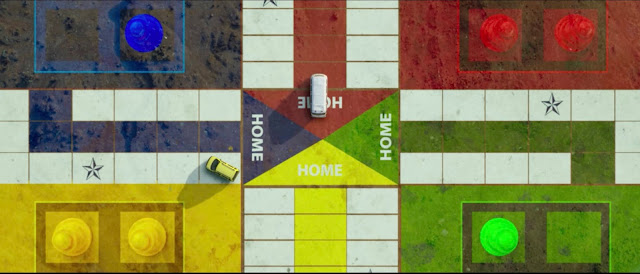
The characters of Ludo are driven by the emotion of love. They demonstrate the different facets of love. In a sublime moment, Mini (Inayat Verma) tells Bittu that she does not want her pet Chikoo back as he is happy with his new foster family. If Chikoo is happy, she is happy. Mini imparts the wisdom to Bittu that love is about sacrifice. It makes Bittu realize that his own daughter Ruhi is also happy with her new father and he needs to accept the same. Bittu is the only protagonist who dies in the end because he learned the difference between love and ego and sacrificed himself to protect his family. It is not surprising that it is red—the colour of love and blood—that represents his story.


There is Alok who goes to Pinky’s house and tries to have a glimpse of her before he begins his day. Once he sees her, he does the gesture of being blessed as they do in the places of worship. For him, love is about devotion. In Aabaad Barbaad, they say, “Meetha sa yeh zeher, main to peeta rahunga. Tu khuda na sahi, main to sajde karunga.” Alok will keep on drinking this sweet poison of love. She might not be God, but he will bow down before her. He is the extreme version of Mohan (Ranvir Shorey) of Aaja Nachle. He is ready to go to any extent to make Pinky happy even if it means losing everything that he owns in his life. He donates his entire savings to Pinky despite knowing that she is only using him. In his life, he preferred Amitabh Bachchan as an actor but because Pinky liked Mithun Chakraborty, he becomes a fan of the Disco Dancer actor. He has lost his identity because of his steadfast loyalty and dedication to Pinky. He truly is an emotional fool and it is love that makes him become one.

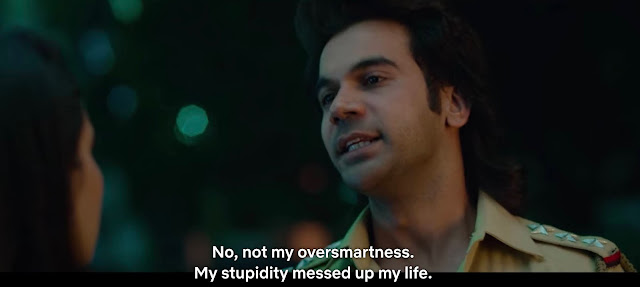
Early in Ludo, Akash lands up at Shruti’s house and asks her, “Pahunch gayi jahan pahunchna tha.” She replies, “Haan, usse bhi aage.” Shruti was made to believe that to be happy in life, she has to marry a rich boy. She has a friends-with-benefits relationship with Akash but she does not want to be serious with him as he is not rich. The problem is not that Akash is not rich now; the problem is he will never be rich even in the future. “Kam paise me khush rehna difficult hai, par zyada me impossible,” reaffirms Akash. This is the reason Shruti is denying and running away from her feelings for him. She says to him, “Mujhe mere raaste se mat bhatkao,” because she wants to go somewhere else in life. There was another Shruti (Ileana D’Cruz) in Barfi! whose mother discouraged her from taking her relationship forward with the man she loves. Her mother had left the man she had loved in her youth to marry someone who could give her a better life. Shruti follows the same path as her mother and leaves Barfi (Ranbir Kapoor) to marry another guy. However, she lives a life of perennial regret as she did not have the courage to listen to her heart. Shruti from Ludo decides to not go down the path taken by her namesake and marries Akash even if it means living a life with limited means. Because love is about acceptance. It is about listening to the heart. Shruti and Akash have a Yes Boss–type ending where they travel on a scooter and look at another couple in their car. They have no regrets and are content with what they have.

Rahul is bullied by his boss at the mall. Sheeja is ridiculed by her coworkers at the hospital. It is fate that brings them together. They belong to different regions and speak a language that the other does not understand. There is minimal spoken conversation between them yet they manage to communicate. As they said in Barfi!, “Khamoshi bhi pyaar ki zubaan hoti haii,” Rahul and Sheeja speak through silences. Love is about the unspoken.


Ludo is also a film about shared identities and universal connections. The different stories in the film are about characters finding and relating to their second self. Akash is a ventriloquist and carries a dummy that resembles him. He names it Aks—his reflection—and adds that he is his alter-ego. Aks can freely say the things that Akash hesitates to speak about. Bittu finds his Aks in Mini. Mini’s relationship with Chikoo has parallels in Bittu’s relationship with his daughter Ruhi. Chikoo has been adopted by another family as Mini’s nanny was not amenable to taking care of him. Likewise, Ruhi has a stepfather as her mother separated from Bittu after he was sent to jail. At some later stage, Bittu and Mini are even dressed in the same shirt. There is Alok whose alter-ego is Mithun Chakraborty. He follows all his mannerisms and becomes the “second-hand Mithun” because Pinky is his fan even though he prefers Amitabh Bachchan personally. Then, there is the trigger-happy Sattu Bhaiya who lets go of Rahul because his own name is also Rahul. He sees himself in Rahul. The love story of Rahul and Sheeja is again mirrored in the love story of Sattu Bhaiya and Lata Kutty (Shalini Vatsa).

Aks
There are more connections between the characters. Akash, Alok, and Bittu are at different stages of the same dilemma related to the woman in their life. Akash likes Shruti but she is getting married to another guy. Alok likes Pinky but she has married someone else and has a newborn kid. Bittu was married to Asha (Asha Negi) and is separated now but he wants to connect with his young daughter. The angle of the child also has a similar essence in the different stories. Alok has more love for Pinky’s kid Babu than his real father. Likewise, in Bittu’s absence, Bhanu (Bhanu Uday) became the father to Ruhi and showered her with the love that her real father could not due to some circumstances. Fathers play a special role in Anurag Basu’s films as seen in the relationship between Barfi and his father in Barfi! and the one between Jagga (Ranbir Kapoor) and his adopted father in Jagga Jasoos. Basu, in fact, also opens Ludo by paying a tribute to his father.

Fathers
Apart from the inherent similarity in all the four stories, Ludo links them through other ways as well. Both Alok and Bittu are former gangsters. Alok has three friends who are often seen with him. Likewise, Bittu forces another trinity—Kali, Shiva, and Daruka—to come along with him to keep Mini entertained when he kidnaps her. Early in the film, Akash is shown with his foot outside the car. Later, Sattu Bhaiya is seen in the exact same position. Like Mini guides Bittu on the call when he speaks to her parents, Akash makes noises of Shruti’s parents when she speaks to her fiancé. Like Rahul stands up in front of his manager who was always bullying him, Sattu Bhaiya fights the doctor who was sexually abusing all the nurses in the hospital. Through these linkages, Basu is reiterating the connections between the different stories.

Foot

The trinity
There is more in Ludo that Basu adapts from some of his previous films, such as Barfi! and Jagga Jasoos. They all have the whimsical Wes Anderson-ish quality about them. Early in Barfi!, the narrator sings, “Radio on hua, Amma off hui,” when Barfi’s mother passes away. It is a sad moment but Basu makes it funny. In Ludo, a lot of serious things occur but the proceedings are treated lightly, especially, death. Apart from these, many scenes and characters of Ludo remind of Basu’s oeuvre. Shruti and Akash were also the names of the characters in Jagga Jasoos. Shruti (Katrina Kaif) was the journalist and Akash was her boyfriend who passed away. Shruti also teaches the kids that we are all like comic characters and our stories are written by God. He adds in certain unpredictable plot twists if he wants to make two characters meet which is again similar to the theme of Ludo as explained by Yamraj. In Ludo, when a woman runs away with all his money, Alok lets out a scream which harks back to the scream of (another) Shruti (Konkona Sensharma) in Life In A Metro where Monty (Irrfan) advises her to let her anger out. There are many more self-referential scenes and themes in Ludo; some of them are given below.

Ludo and Jagga Jasoos

Ludo and Barfi!

Ludo and Barfi!

Ludo and Jagga Jasoos
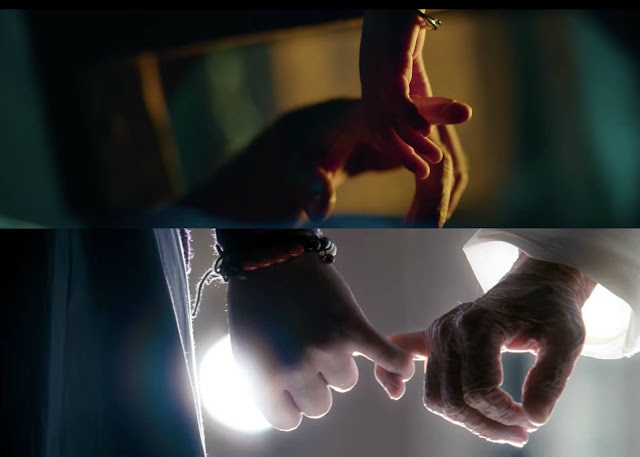
Ludo and Barfi!
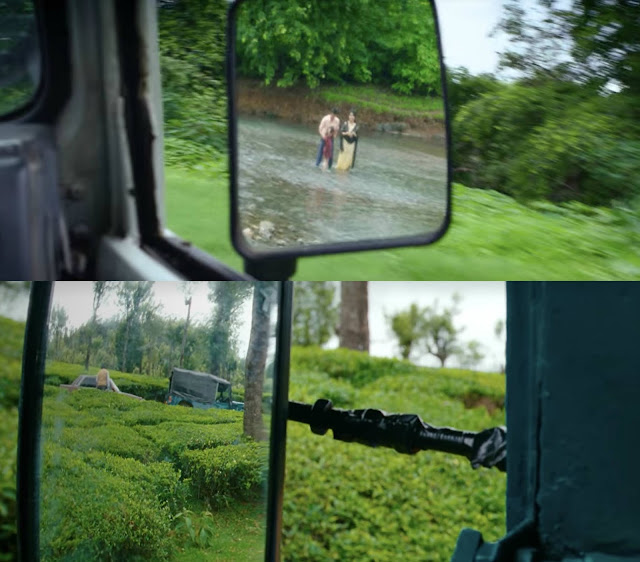
Ludo and Barfi!

Ludo and Jagga Jasoos

Ludo and Jagga Jasoos
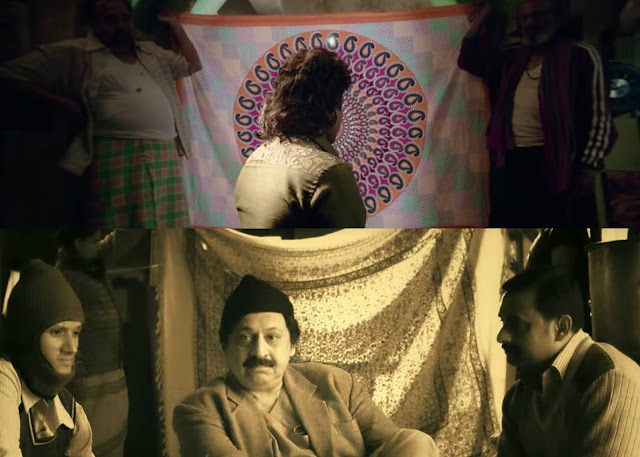
Ludo and Barfi!

Ludo and Barfi!

Ludo and Life In A Metro
Mini and Bittu hatch a plan together to extract money from her parents where he will pretend to kidnap her. The whole angle of kidnapping in Ludo is again reminiscent of Barfi! where Barfi does the same with Jhilmil and takes her to Kolkata. The letter that Mini writes to her parents by cutting letters from her book is the same way that Barfi wrote when he asked for Jhilmil’s ransom. Bittu and Mini run away to the villages crossing rivulets, as was seen in Barfi!, too. Just as it was a bit uncomfortable to watch Jhilmil imagining herself getting married to Barfi, it initially takes time to get used to seeing Bittu and Mini alone without worrying about the power dynamics between them. When the police finally catch up with Bittu and Mini, there is a Highway-like gunshot heard bringing an end to the fantasy ride.
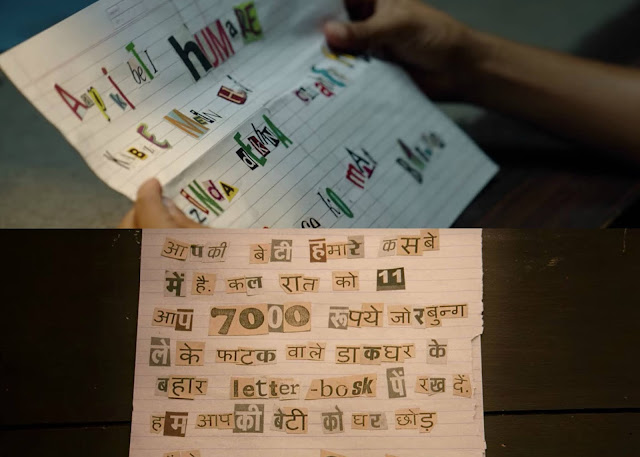
Ludo and Barfi!

Barfi! and Jagga Jasoos and Ludo
The story of Bittu and Mini has roots in Rabindranath Tagore’s Kabuliwallah. Bittu returns from prison hoping to meet his daughter Ruhi, who, however, has been sent to a hostel. During a chance encounter, Bittu meets Mini who is the same age as Ruhi. A bond develops between the two as Mini reminds Bittu of Ruhi. In Kabuliwallah, a trader from Afghanistan named Rahmat develops a friendship with a little girl named Mini in Calcutta. Talking with Mini reminds Rahmat of his daughter in Kabul who is the same age as Mini. Towards the end, Mini’s father realizes that Rahmat was a father just as he was a father stressing the universality of human relationships. The parallels between Ludo and Kabuliwallah are easily discernible. Even the name Mini is the same in both stories.


Kabuliwallah
The cinematography, also credited to Basu, in Ludo includes many top shots as it is mimicking a ludo board. The film also has many similar stair shots in all four stories. This was also seen in Jagga Jasoos when Shruti falls down the stairs in Shundi. There are also scenes in Ludo where characters are presented in a titled position. One additional motif was also the presence of mirror shots in the story of Bittu and Mini. It is more prominent in the sequence when Bittu escapes in the police car. The rearview mirror shows the image of Mini and her family and a gunshot shatters the mirror breaking the relationships that were formed earlier.

Stairs
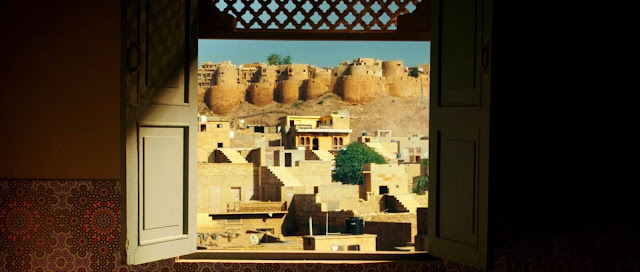
Jagga Jasoos

Tilt in the scenes


Mirrors
Ludo also adds a lot of quirks to the narrative. The funniest bit was the one where Sattu Bhaiya watches Akash’s porn clip and the entire houseboat starts shaking. The miniature model that Alu makes to demonstrate the release of Pinky’s husband from the crane uses an aloo and a mirchi. When the inspector speaks to Bittu, the camera pans to show his raised feet. The plants at Akash’s house are kept in the legs of mannequins. In the footsteps of Bhaag DK Bose, there is Life ki lag gaye hai Ludo which is obviously pointing to popular slang. Additionally, there are characters who say Lodu which is an anagram of Ludo. All the cars in the film have the vehicle number that starts with Ludo. Towards the end, the stories and the colors converge at befittingly-titled Hotel Paradise. Despite all these, I felt that Ludo does not become greater than the sum of its individual parts. It lacks the emotional heft of Barfi! and the wild craziness of Jagga Jasoos. It seems a controlled film but I will still say that it is a good film with some nice performances.

Car Numbers
Many a time in Ludo, the song O Beta Ji Kismat Ki Hawa from Albela (1951) starts playing. Kismat ki hawa kabhi naram, kabhi garam. Kabhi naram-naram, kabhi garam-garam. This perfectly fits the philosophy of Ludo. Life is a game of randomness. Paap (sin) and punya (virtue) are nothing but man-made constructs aimed to bring a sense of control to life. The way life turns out is not predicated on one’s actions. In the Mahabharata, the Kauravas went to heaven, while the Pandavas were in hell. Sattu Bhaiya did the most horrible things, yet he survived even after being left for dead six times. This is the same underlying theme that Basu also depicted in Jagga Jasoos. In a profound moment in Jagga Jasoos, a group of people get together to celebrate the birthday of a dead man. They sing together and talk about the philosophy of life. “Hum yahaan do din ke meheman hai, yeh maan lo. Nonstop ek party hai, jahaan sab ko aana hai, aur khaana kha ke daaru pi ke chale jaana hai.” Our time on earth is limited and equivalent to going to a party. We are all like the guests who come, eat, drink, and go away. Sometimes, it serves well to remember these words and take a moment to really enjoy the beauty of life around us; after all, who knows what the die of fate will throw next at us.

[Read more of the author on his blog here]





Leave A Comment
You must be logged in to post a comment.